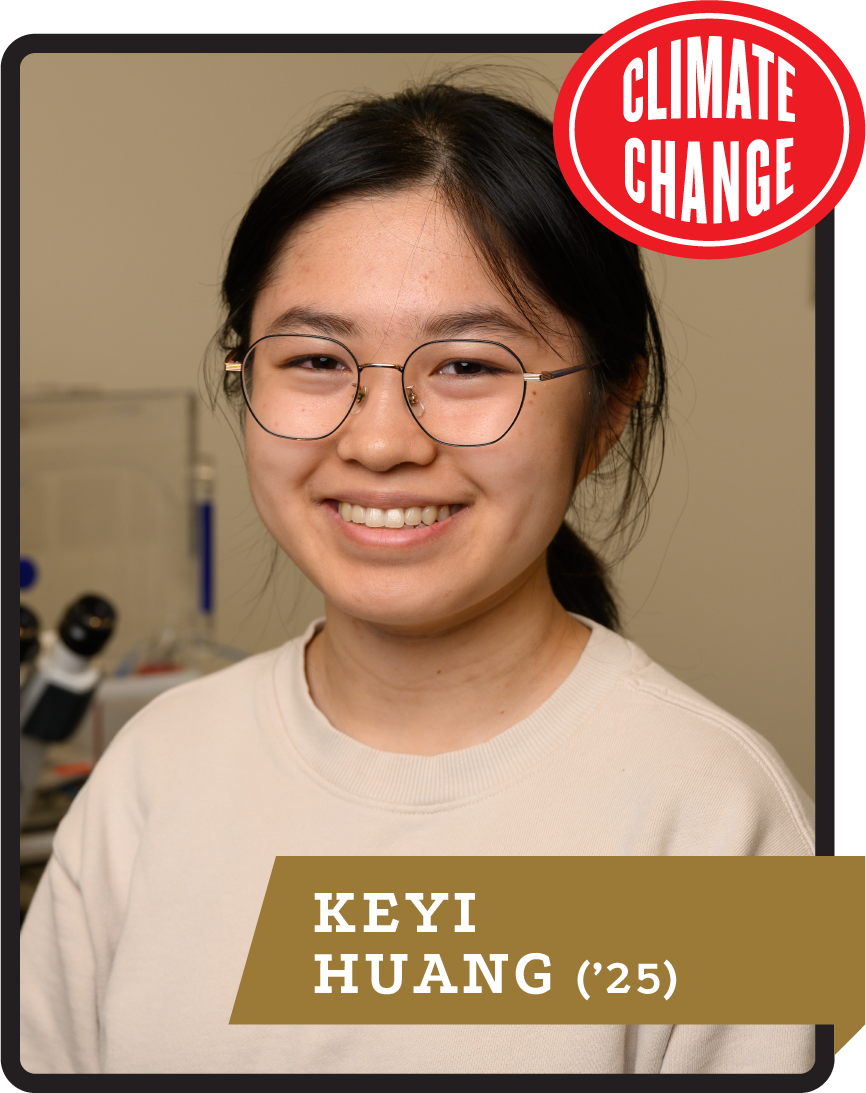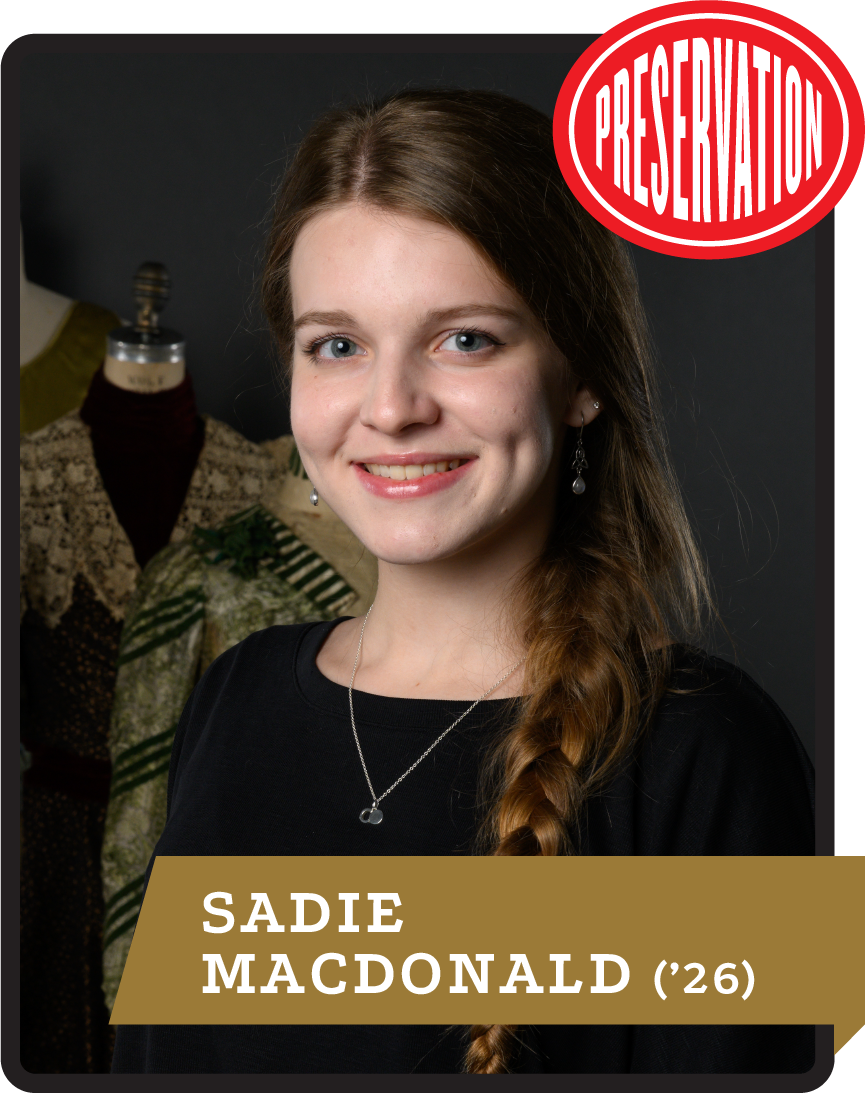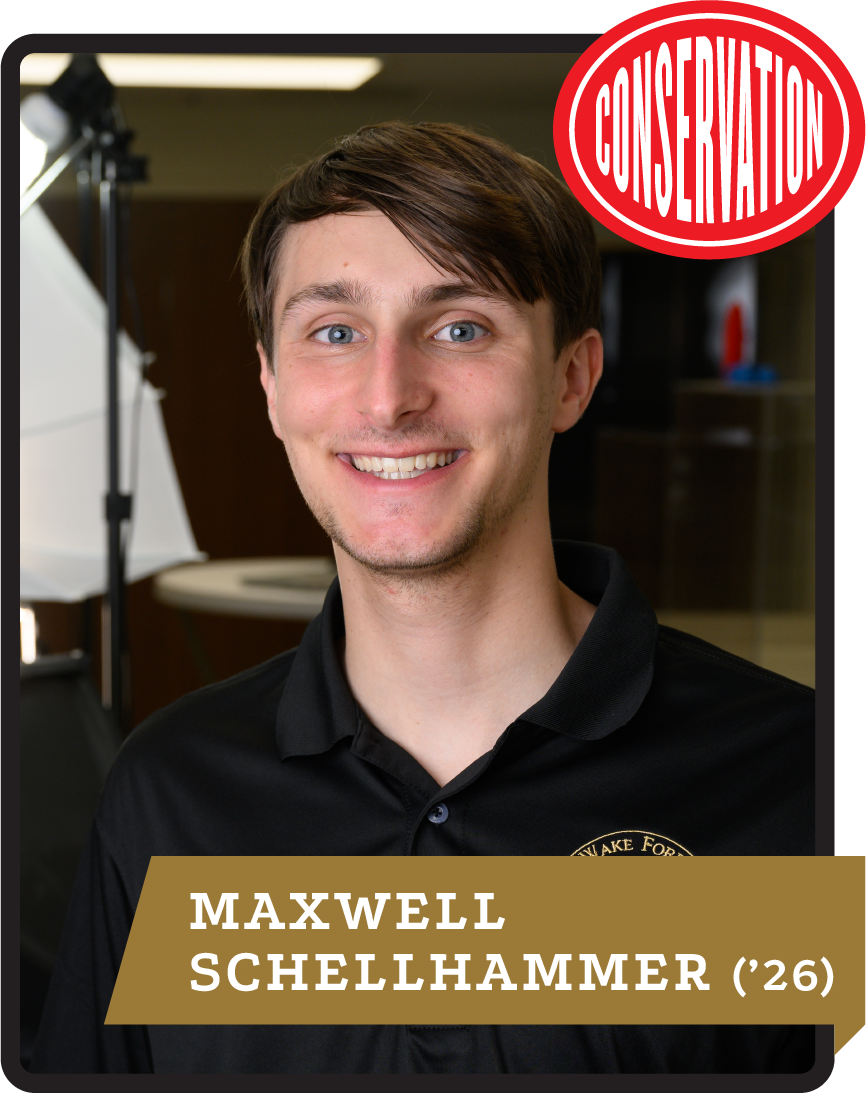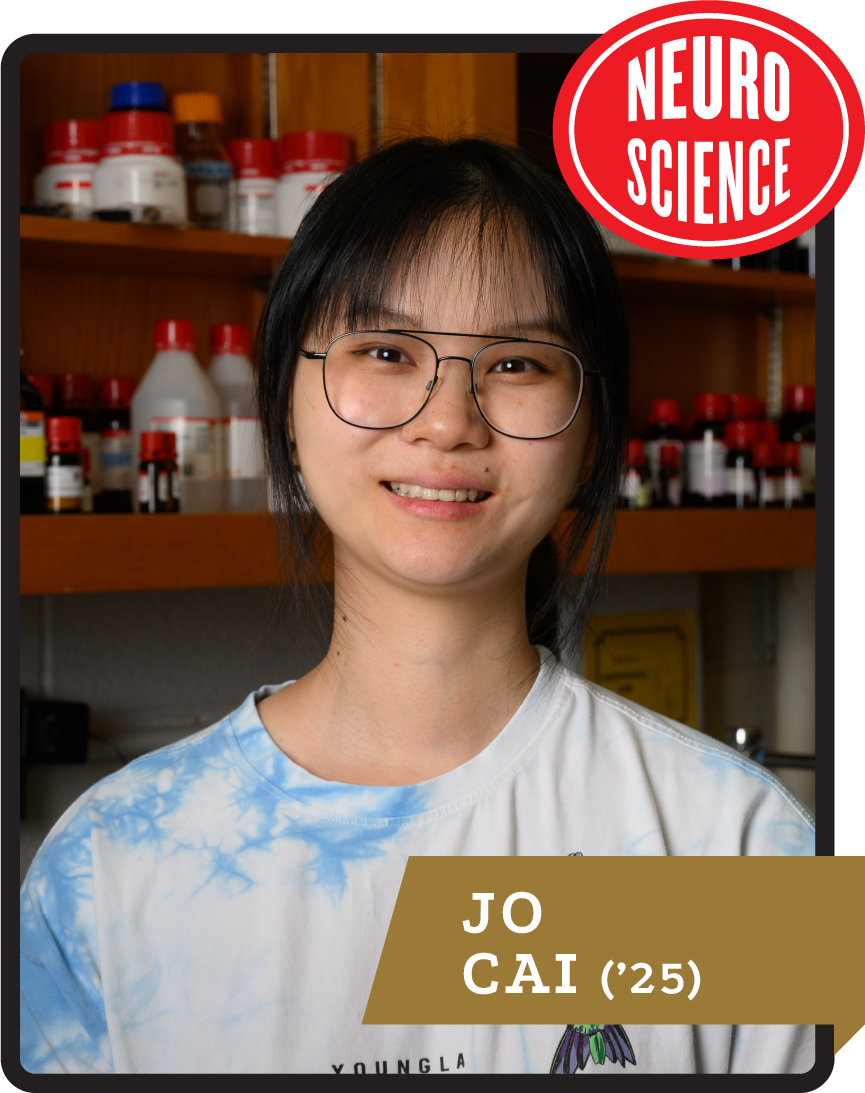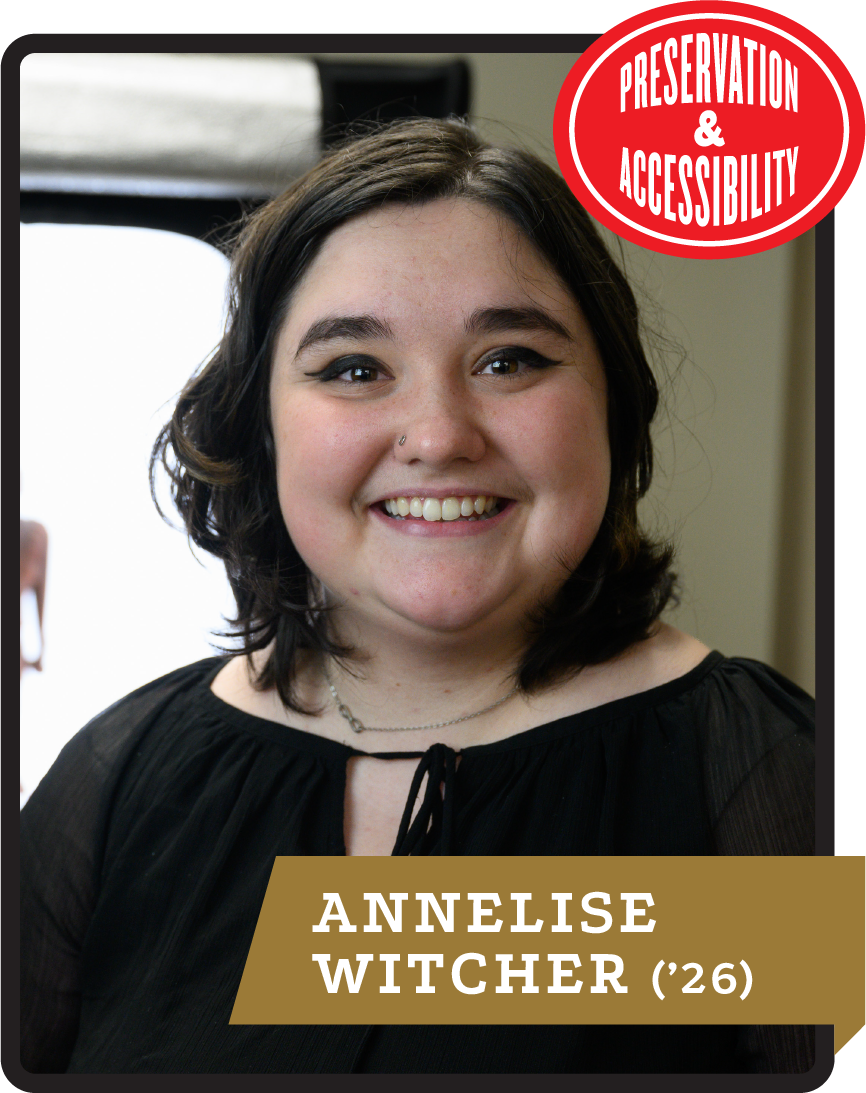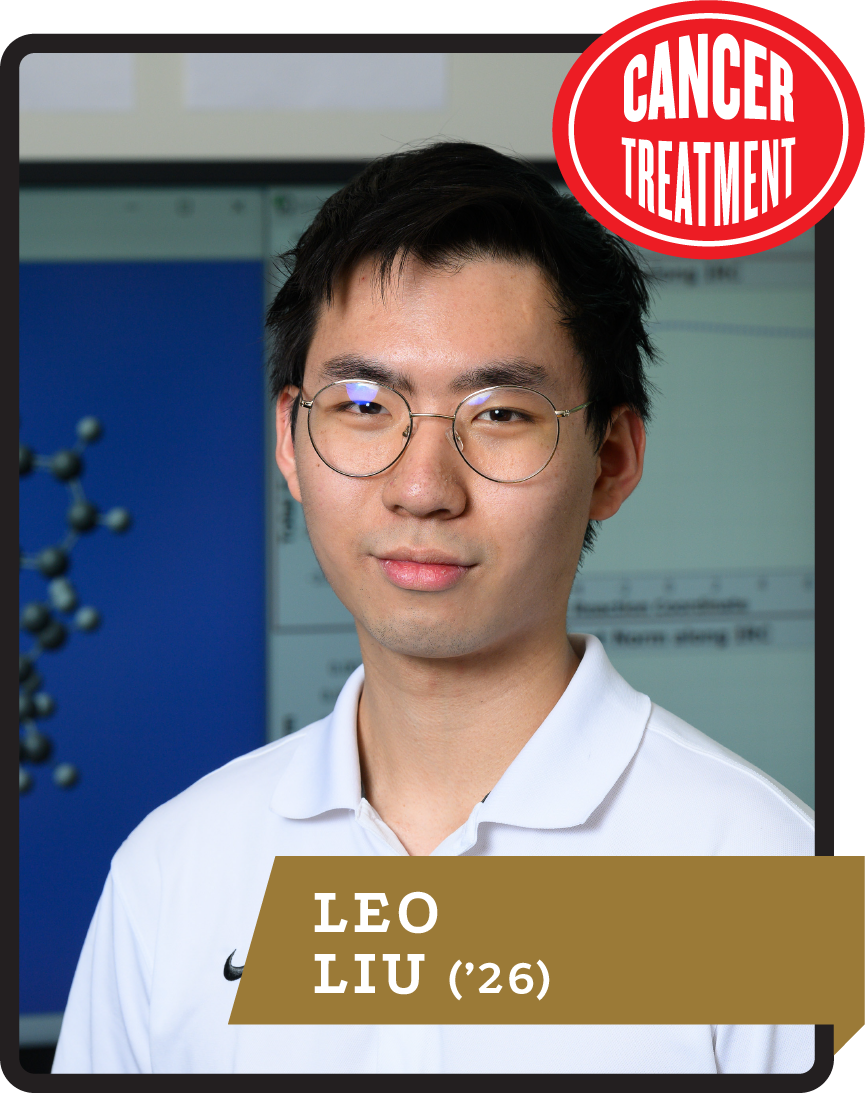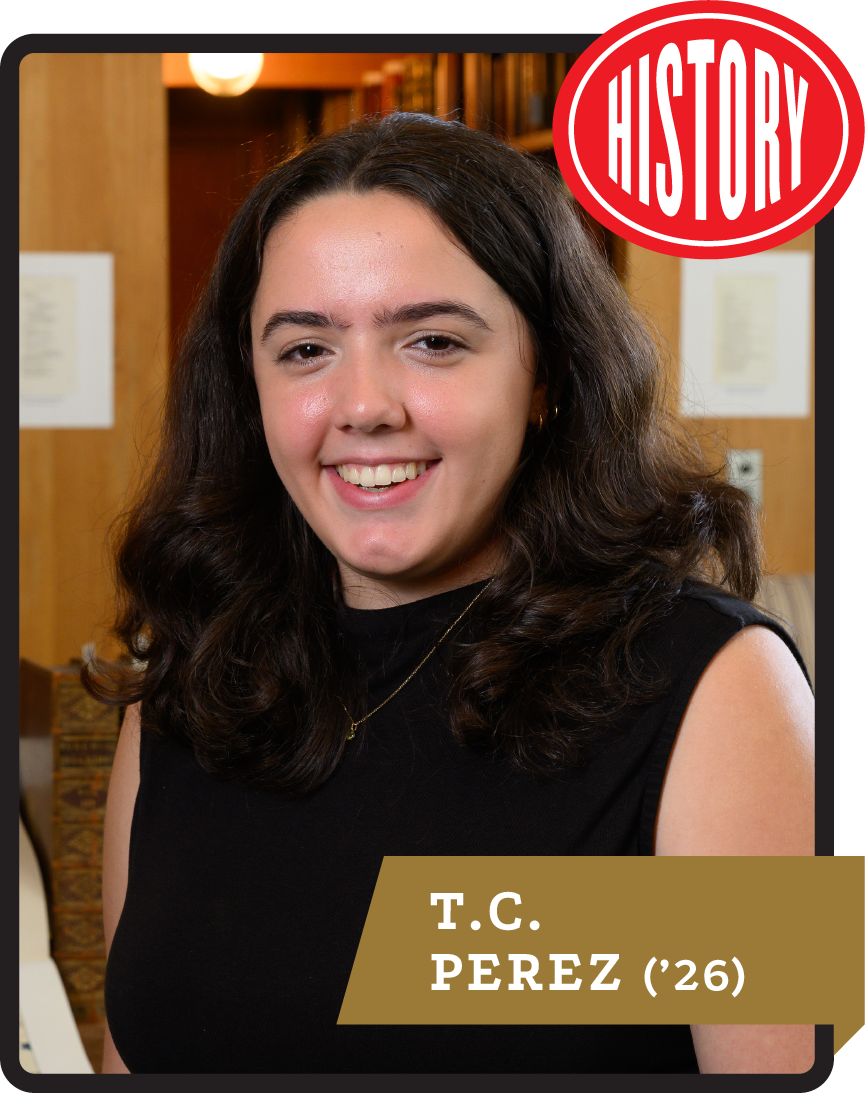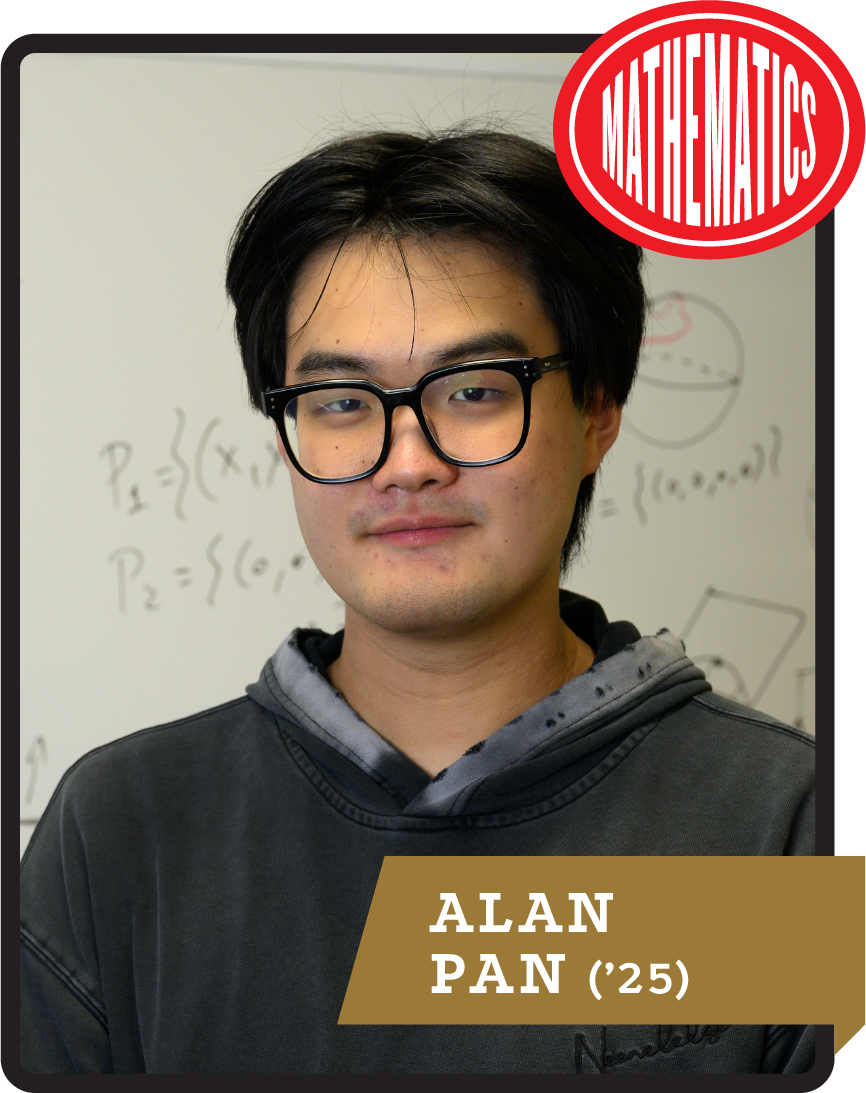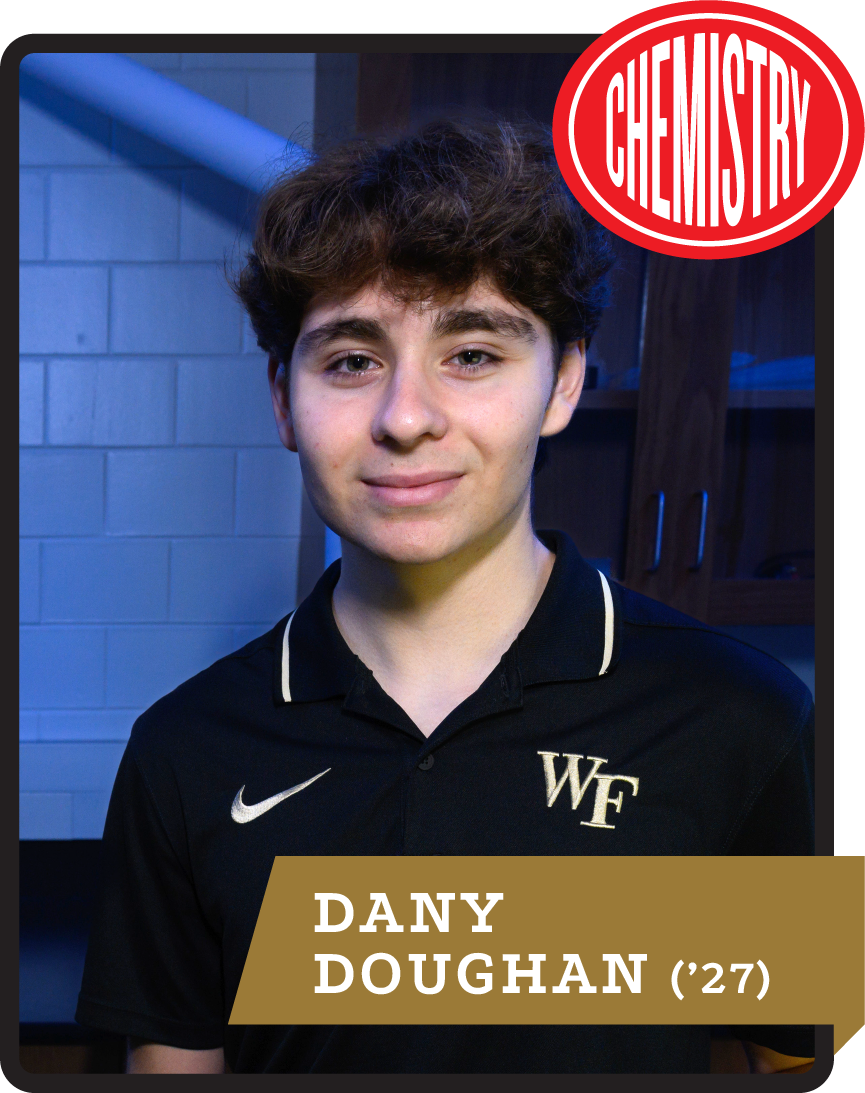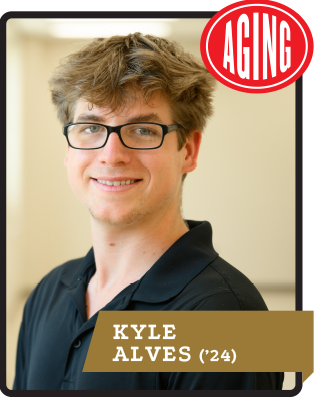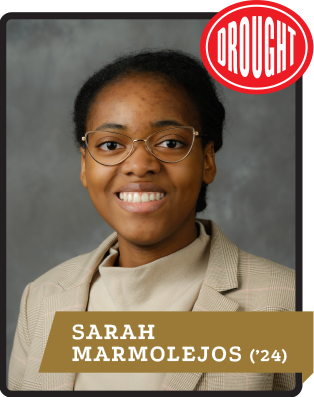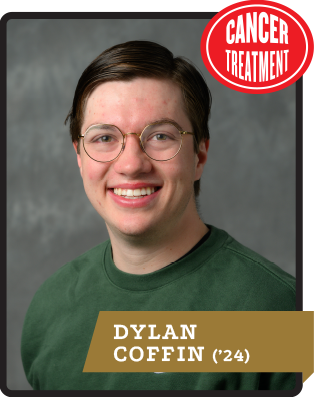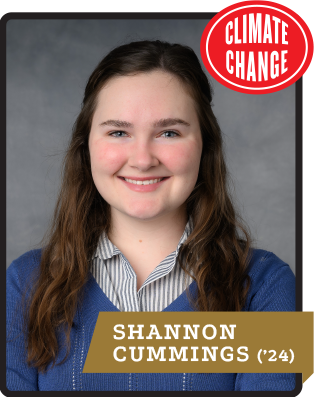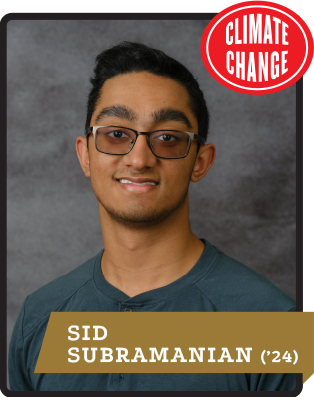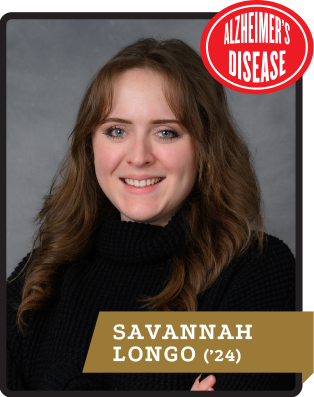
Every year, Wake Forest undergraduates have the opportunity to spend their summer months with a faculty mentor researching and making advances on some of the most challenging questions of our day. This summer, they studied the droughts and wildfires that have plagued parts of the United States, Canada and the globe. They explored the progression of aging. They faced the terrifying disease of cancer. They investigated the effects of climate change. And they stepped into the devastating world of Alzheimer’s disease.
For nearly 20 years, the Undergraduate Research and Creative Activities Center (URECA) has promoted and celebrated mentored scholarship. It is a hallmark of the Wake Forest experience – students and faculty, side by side, working to develop solutions to serious questions in an effort to better the world around them. Here’s a look at just some of the challenges our undergraduates tackled this year.
Keyi Huang (’25)


Hometown: Changsha, China
Major: Biochemistry and Molecular Biology
Faculty Mentor: Gloria Muday, Biology
Topic: Cracking the code to heat-resistant tomatoes
When your tomato plants won’t bear fruit during the dog days of summer, a team of Wake Forest researchers led by biology professor Gloria Muday are in the lab trying to find a plant that will thrive. Keyi Huang, a biochemistry and molecular biology major, worked with Muday researching calcium and ROS signaling in tomato pollen under heat stress. Huang’s graduate school interests center around signaling networks in plants and where signal transduction occurs in cells. “The summer URECA research increased my proficiency in operating microscopes and fine-tuned my critical thinking skills. I am more prepared for graduate school studies after working in professor Muday’s lab,” said Huang.
Sadie MacDonald (’26)
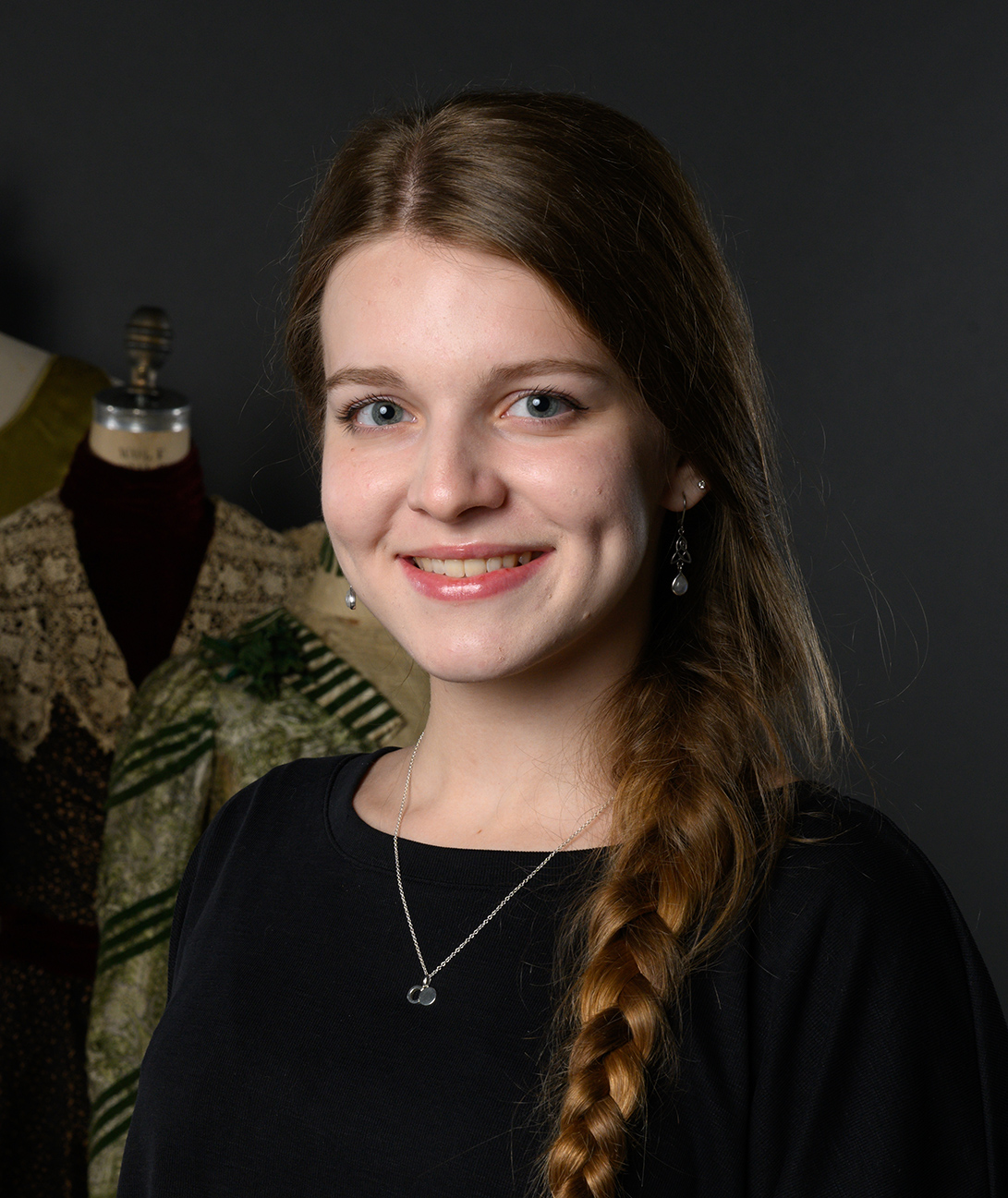

Hometown: Winston-Salem, North Carolina
Major: Studio Art
Faculty Mentor: Mary Wayne-Thomas, Theatre
Topic: Weaving history into the theatre department’s costume database, one garment at a time.
An accurate database helps keep track of all costumes, props and accessories, ensuring nothing gets lost or misplaced. Junior studio art major Sadie MacDonald worked with theatre professor Mary Wayne-Thomas to create an online database that catalogs and documents the historic garment collection of the theater department. “The research fueled my interest in discovering a future career related to the arts, in curating and learning more about historical aspects of fashion and the construction of garments, and the importance of costume design in theater productions,” MacDonald said.
Maxwell Schellhammer (’26)
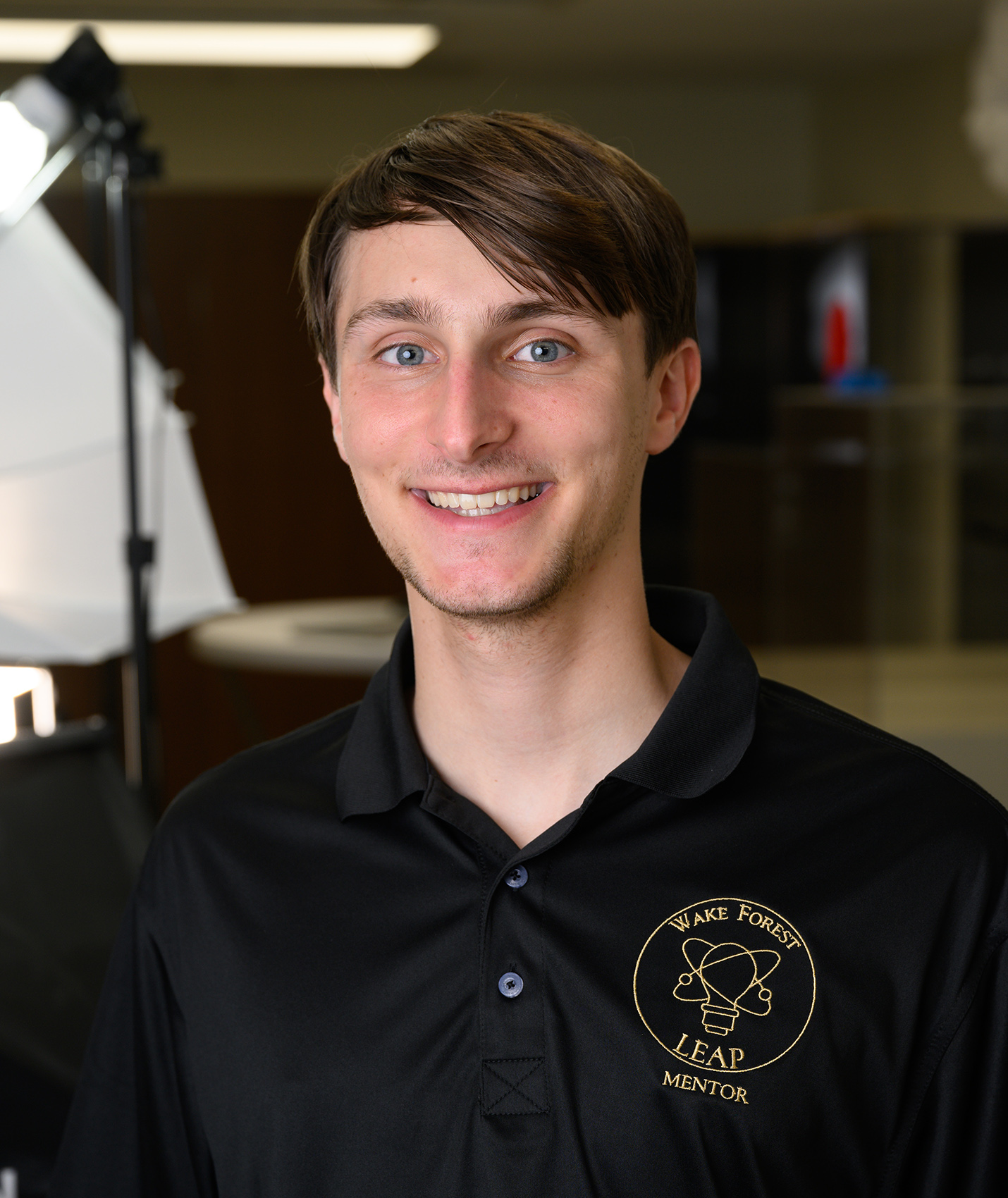

Hometown: Brambleton, Virginia
Major: Engineering and Music
Faculty Mentor: Tricia Clayton, Engineering
Major Scholarships: Christian Cappelluti Memorial Scholarship Fund; Guy and Clara Carswell Scholarship
Topic: From preserving ancient artifacts to protecting campus landscapes, using 3D models to make a global impact with photogrammetry.
Junior engineering major Maxwell Schellhammer and his mentor, engineering professor Tricia Clayton, used photogrammetry, a process of digitizing objects with only pictures, to create high-resolution 3D models for two diverse applications. With Andrew Gurstelle, academic director of Wake Forest’s Lam Museum of Anthropology, photogrammetry enabled the digital preservation of 138 unique terracotta artifacts from Niger as a means to repatriation, helping shift research authority to local archaeologists and communities. With Wake Forest University Facilities, Real Estate, and Planning, drone photogrammetry was implemented to pinpoint erosion hotspots on the banks of Winston-Salem’s Silas Creek. “With funding to continue my ongoing research over the summer, not only was I contribute to the Wake Forest community and the city of Winston-Salem, but I was also able to add to the historical preservation of Bura artifacts and ultimately to humanity as a whole in the spirit of Pro Humanitate,” Schellhammer said.
Jo Cai (’25)
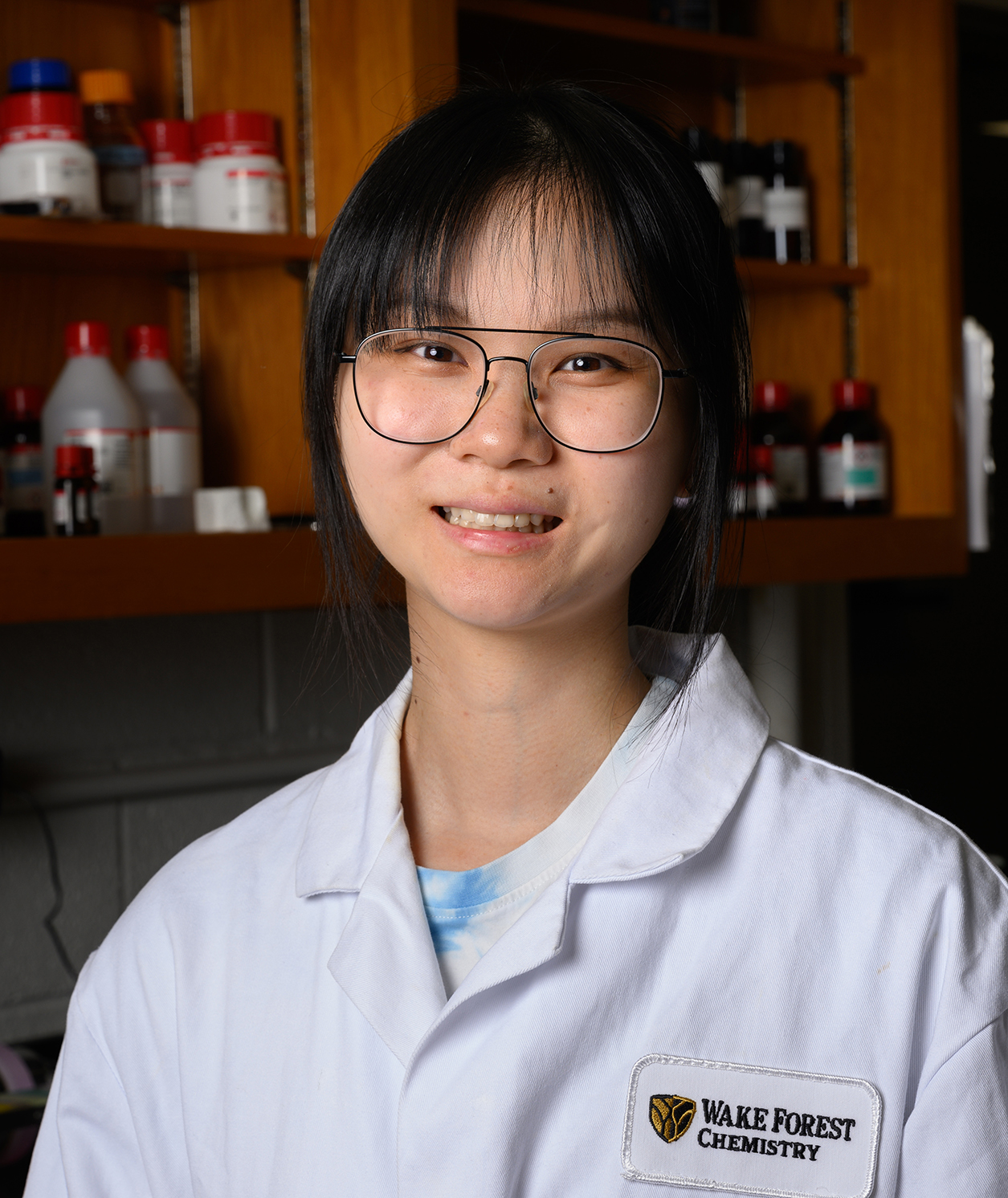

Hometown: Ningbo, China
Major: Biology and Psychology
Faculty Mentor: Joost Maier (MED)
Topic: Uncovering how the brain blends flavors in a quest to decode multisensory perception.
Senior Jo Cai, a double major in biology and psychology and her mentor Joost Maier, a translational neuroscience professor in the Wake Forest School of Medicine used flavor perception in rats as a model system to gain fundamental insights into how the brain processes multisensory information. “Working on this neuroscience-related research project enabled me to gain hands-on research experience and to think critically. It helped put me in an ideal position to start applying to PhD programs in my senior year,” Cai said.
Annelise Witcher (’26)
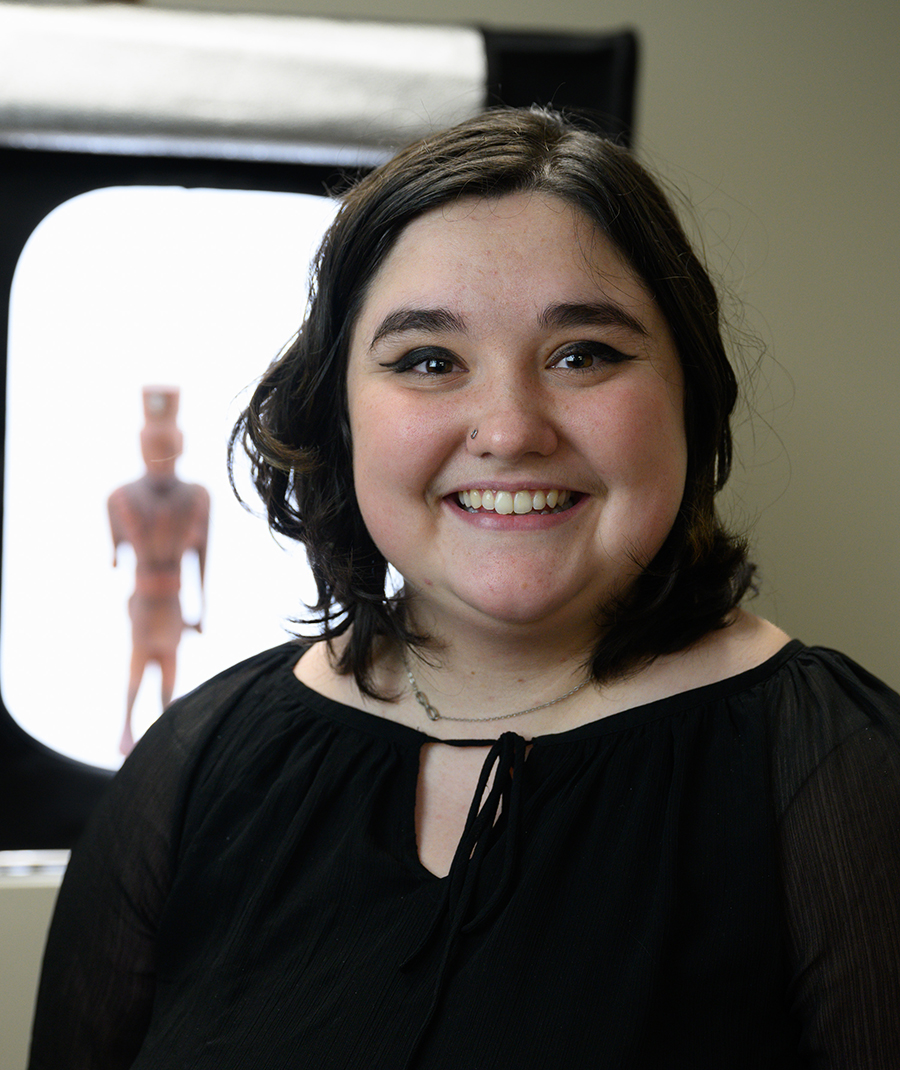

Hometown: Mount Pleasant, South Carolina
Major: Anthropology
Faculty Mentor: Andrew Gurstelle, Anthropology
Topic: Transforming museum experiences with 3D models, making archaeology accessible and interactive for all visitors.
When it comes to archaeological research, artifact analysis and museum curation, 3D models generated through photogrammetry can be used to allow for hands-on museum experiences and accessibility for visually impaired visitors. Junior anthropology major Annelise Witcher and anthropology professor Andrew Gurstelle created 3D models of Lam Museum objects to create interactive and accessible museum exhibits. Witcher plans to pursue a career in museum curation. “Working with the objects and bringing them to life through photogrammetry has been such a rewarding experience. Not only did I gain a deeper understanding of the objects and their cultural significance, I was able to adjust the models to allow for greater accessibility and interactiveness,” said Witcher.
Leo Liu (’26)
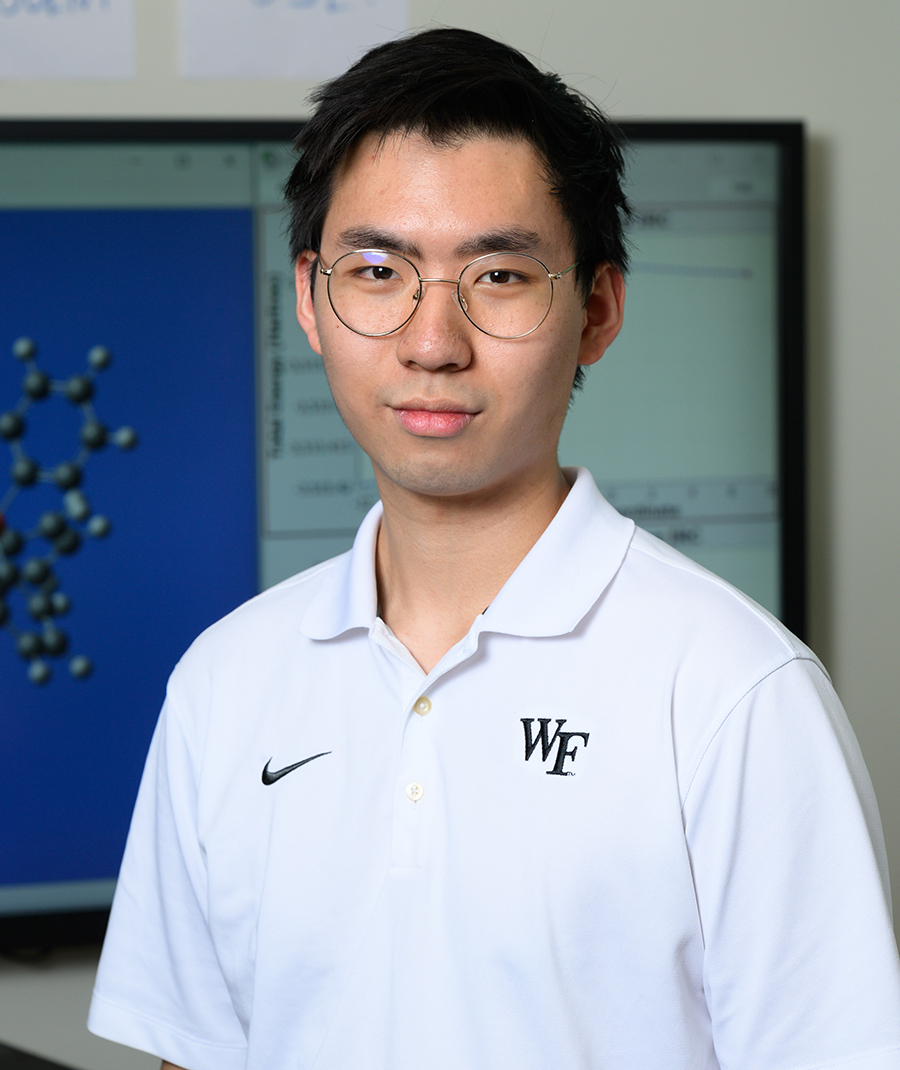

Hometown: Corona, New York
Major: Physics and Chemistry with minor in Math
Faculty Mentor: Wendu Ding, Chemistry
Topic: Diving into the world of gold catalysis, modeling reactions that could spark breakthroughs in medicine and environmental sustainability.
“Engaging in research through the URECA program has been an invaluable part of my undergraduate experience, especially since I plan to pursue a PhD in chemistry,” said junior Leo Liu. His summer research with professor Wendu Ding focused on computationally modeling and simulating the gold catalysis of N-propargyl benzamide in different solvents—a gateway to more advanced catalytic reactions and whose product molecule possesses potential as an anticancer agent, among other biological possibilities. “I have a great appreciation and curiosity for chemistry and its applications across a myriad of fields, whether it be the development of the next life-altering medicine or the minimization of harmful industrial waste in our environment. You can’t possibly find yourself bored with research, because there’s always something new and exciting around the corner. I’m constantly searching for the next ‘UREKA!’ moment.”
T.C. Perez (’26)
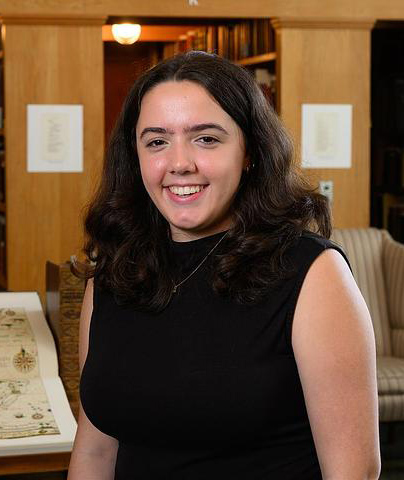

Hometown: Miami Springs, Florida
Major: History; minor in Latin American and Latino Studies
Faculty Mentor: J’Nese Williams, History
Major Scholarships: Ross K. Smith Scholarship
Topic: Uncovering the roots of modern capitalism in their research on how coca plants shaped colonial empires and botanical knowledge.
Junior history major T.C. Perez and history professor J’Nese Williams conducted research this summer on a project entitled “Global Empires of Coca: How a Bush Became a Seed for Modern Global Capitalism.” Williams’s scholarship includes expertise in the history of science, science and empire, and colonial botany. “Our work aimed to contribute to a more nuanced historical narrative of empire that challenges those that have omitted the intricate relationships between plants and colonial governance,” said Perez. The pair spent the summer in the Wake Forest archives analyzing primary sources from Peruvian travel narratives and European encyclopedias to demonstrate the parallel rise of botanical knowledge circulation from Peru and the rise of the Spanish Empire.
Alan Pan (’25)
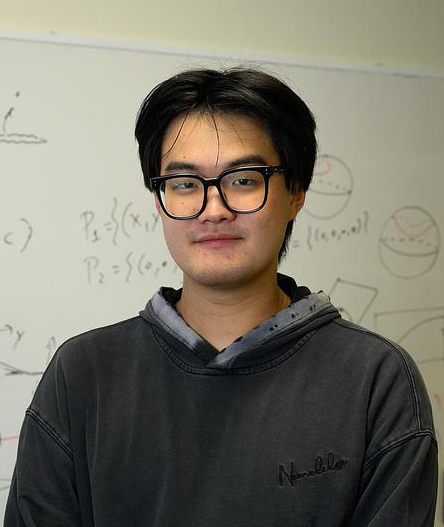

Hometown: Houston, Texas
Major: Mathematics and Computer Science
Faculty Mentor: Leandro Lichtenfelz, Mathematics
Topic: Exploring the real-life applications of curve shortening flow, revealing how math shapes our everyday technology from navigation to weather forecasting.
Mathematics and computer science double major Alan Pan and Assistant Professor of Mathematics Leandro Lichtenfelz looked at curve shortening flow – a geometric evolution process that characterizes the progressive movement of a curve in the direction of its normal vector. “With guidance from professor Leandro, I had my first hands-on opportunity to see how the theorems we learn in class can be applied to real-life situations. It was the first time I truly felt that math is integrated into every aspect of our lives. From navigation systems to weather forecasting, nearly every technology we rely on today is powered by the capabilities of mathematics,” said Pan.
Samantha Chin (’25)
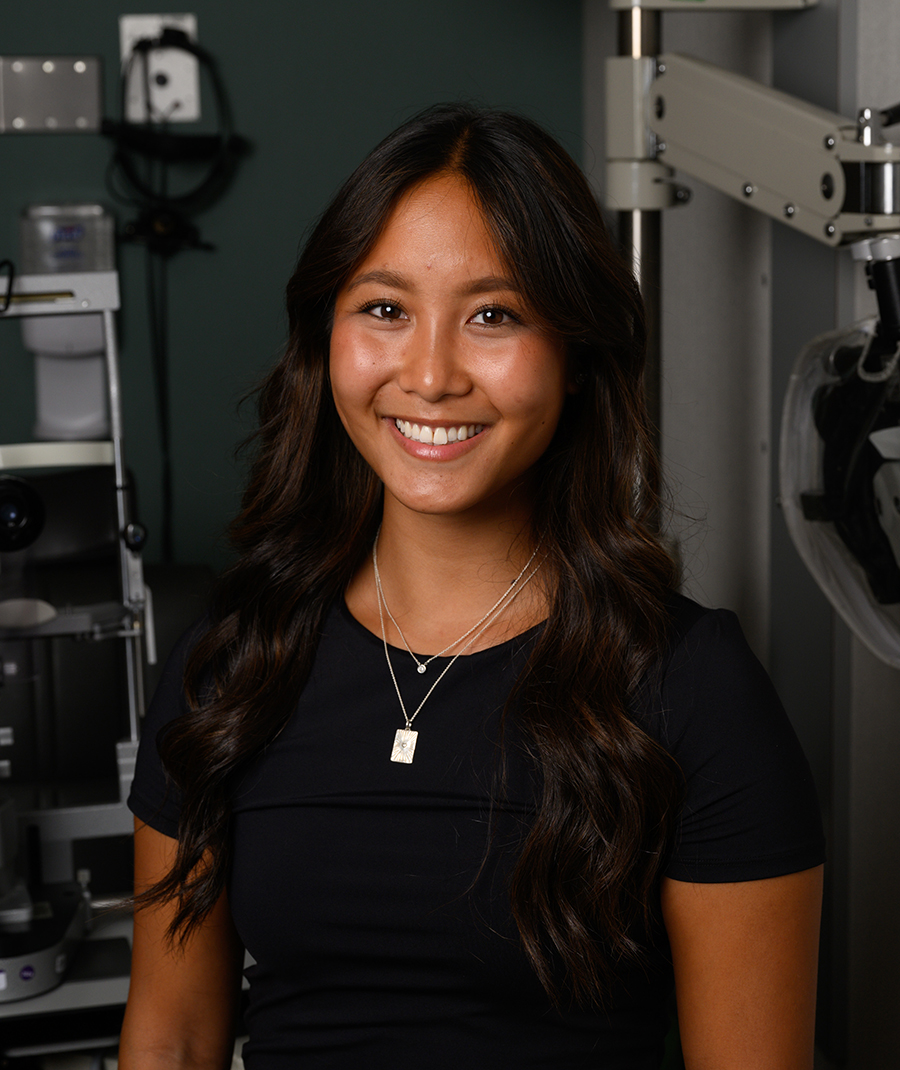

Hometown: Montvale, New Jersey
Major: Health and Exercise Science; minors in Engineering and Chemistry
Faculty Mentor: Dr. Atalie Thompson (MED) and Gary Miller (HES)
Major Scholarships: Hubert Humphrey Studies Abroad Scholarship
Topic: Tackling glaucoma by researching dietary nitrate in beetroot juice as a potential treatment with fewer side effects.
More than 80 million people worldwide have glaucoma. Of these, approximately 11 million are estimated to be bilaterally blind. For her summer research project, senior Samantha Chin worked with Wake Forest Medical School’s Dr. Atalie Thompson and health and exercise science professor Gary Miller. The team examined the effect of dietary nitrate in beetroot juice on intraocular pressure as well as the relationship between resting blood pressure and intraocular pressure in search of an alternative treatment for glaucoma with fewer side effects than current medications, such as dry eyes, itching sensation, ocular redness and blurred vision. Chin plans to go to medical school after graduation to study ophthalmology. “This collaboration allowed me to work on team-building skills in a professional setting by seeking guidance and advice while also taking more of a leadership role in a project,” Chin said.
Dany Doughan (’27)
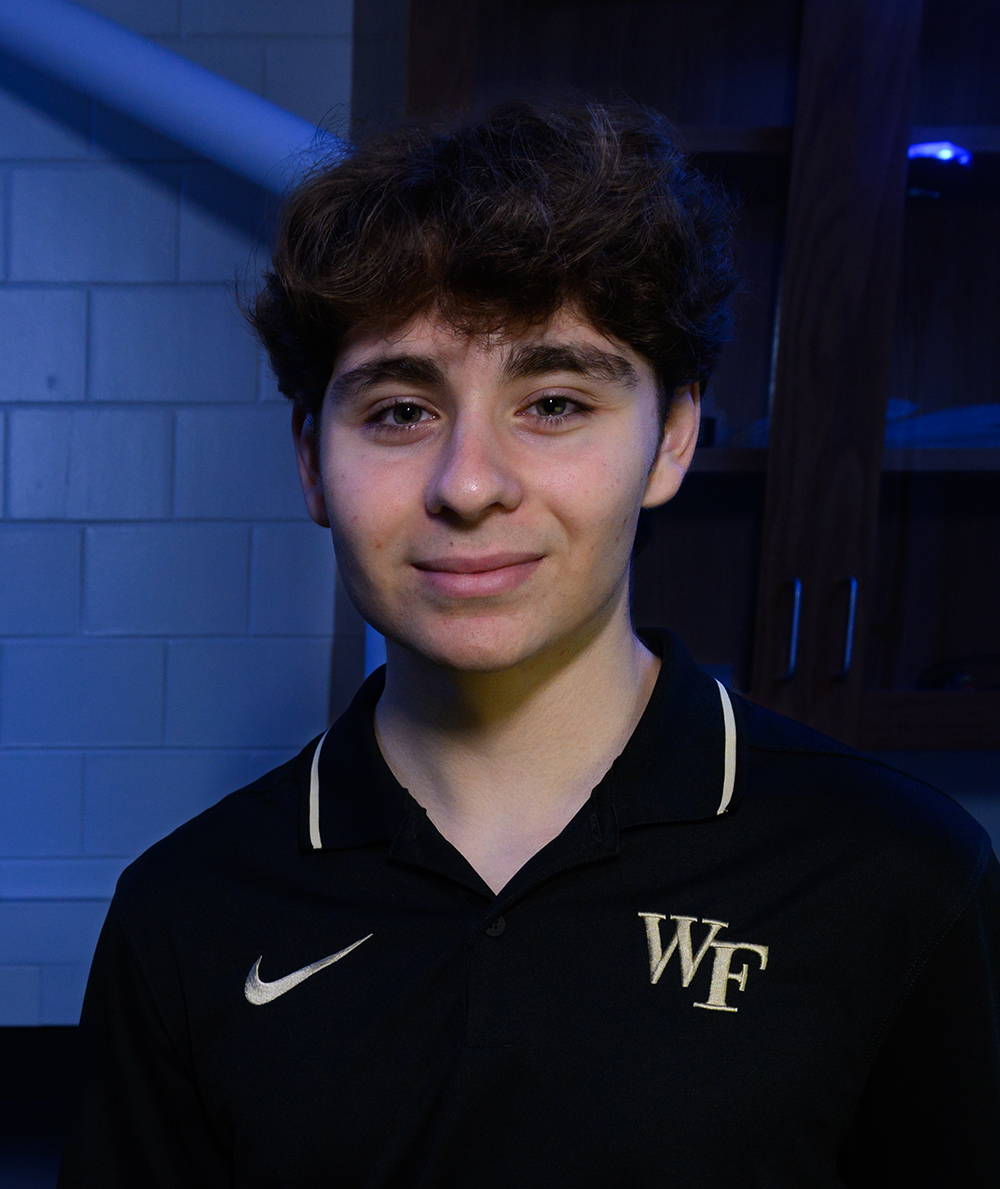

Faculty Mentor: Elham Ghardiri, Chemistry
Topic: Diving into the chemistry of nanomaterial using spectroscopy to enhance our understanding of films for biomedical and energy applications.
Chemistry professor Elham Ghadiri’s research focuses on nanomaterials that have applications in biomedical sciences and energy conversion. Sophomore Dany Doughan studied the physical, chemical and optoelectronic qualities of the films produced in the lab using data collected from spectroscopy and photoluminescence tests to characterize the difference between films and to get a better understanding of their qualities and potential. “I am planning to remain on professor Ghadiri’s research team for several semesters, and this summer fellowship opportunity provided me with invaluable experience.”
Kyle Alves (’24)
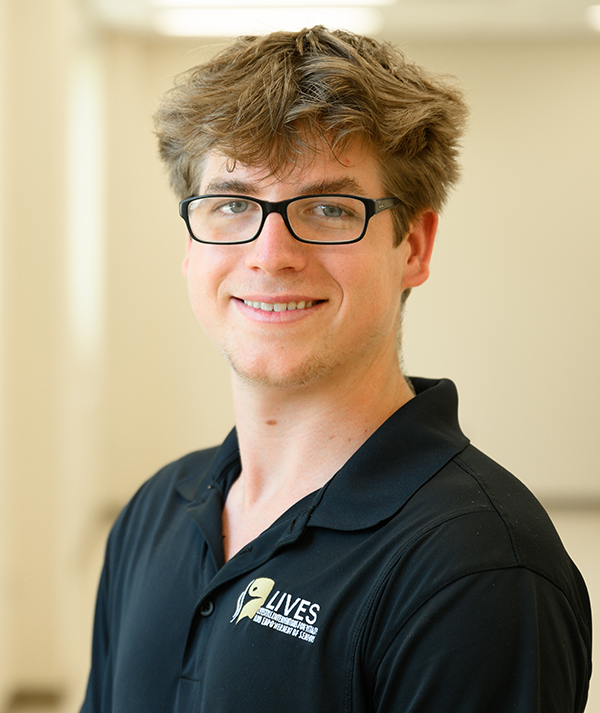

Hometown: Palm Coast, FL
Major: Health and Exercise Science
Faculty Mentor: Lindsay Comstock-Ferguson, Chemistry
Major Scholarships: Watkins-Richardson Memorial Fund
Topic: Feasibility of testing the impact of testing particular physical activities on cognitive and physical functioning of older adults
To the layman, High-Intensity Interval Resistance Training (HIIRT) sounds like something only NFL players should try. In truth, HIIRT is not painful. And Kyle Alves hopes you give it a shot one day.
In 2023, Alves earned a summer grant to help with HIIRT, part of an ongoing Health and Exercise Science (HES) initiative studying the benefits of exercise in older adults. The hope is that research will demonstrate a positive link between this type of exercise and
improved cognition.
It’s a labor of pride for Alves, whose grandfather is a neurologist specializing in Alzheimer’s Disease study and treatment. With a neuroscience minor supplementing his HES major, Alves intends to
go to medical school and follow his family path.
Sarah Marmolejos (’24)
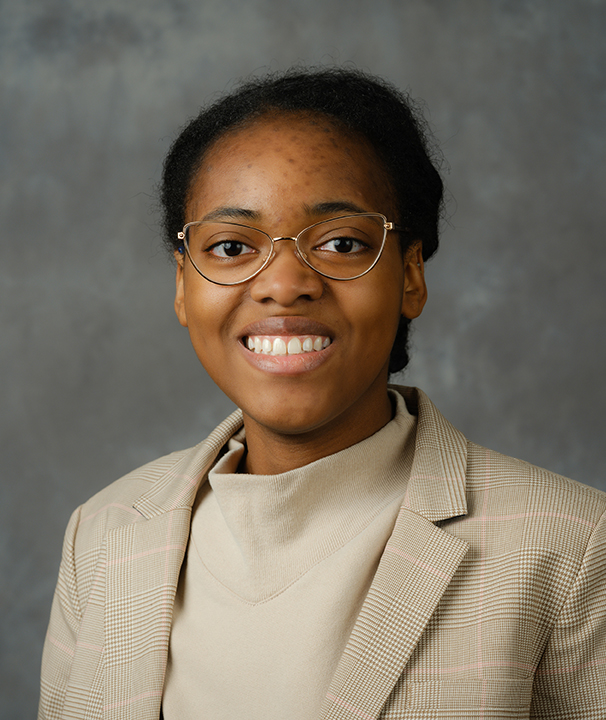

Hometown: Statesville, NC
Major: Engineering
Faculty Mentor: Lauren Lowman, Engineering
Major Scholarships: Kulynych-Story Family Fund; Norcross Family Fund for Magnolia Scholars
Topic: Ways in which drought is measured and predicted
A program in high school transported Sarah Marmolejos’ curiosity from the Earth’s surface to its atmosphere. The opportunity to work in Dr. Lauren Lowman’s Wake Forest engineering lab focused that interest on global drought and one particular measurement of it: Vapor Pressure Deficit (VPD), which is similar to relative humidity.
As Marmolejos began transforming and analyzing large volumes of data in that lab, she determined that some VPD readings in certain regions and climates – Arizona and New Mexico – weren’t always reliable. In the process, the team worked with two international organizations to get better data.
Data science melded with environmental science and engineering. Marmolejos is now driven to helping the planet by understanding how to maximize efficiency in how vital topics are studied and reported.
Dylan Coffin (’24)


Hometown: Cedar Grove, NJ
Major: Medicinal Chemistry and Drug Discovery
Faculty Mentor: Ulrich Bierbach, Chemistry
Major Scholarships: Wake Forest Heritage Scholarship; Joe and Sue Newhall Scholarship; Dr. James Barry Douglas Palmer Scholarship Fund
Topic: Identifying which drugs are worthy of further testing as potential cancer treatments
Dylan Coffin isn’t promising to cure cancer by himself. He just wants to be part of the process, and Wake Forest’s program in medicinal chemistry and drug discovery has been a rewarding point of entry to the fight.
An undergraduate leader in Dr. Ulrich Bierbach’s lab, Coffin has worked to help determine which chemical compounds seem most effective in killing cancer cells. He has presented his findings to the American Cancer Society’s Southeastern regional conference and is confident that his successors in Dr. Bierbach’s group will continue the process.
“We have been able to identify compounds we’d like to emphasize further, and we have been able to test them on cancer cells and get meaningful data,” Coffin said. “There’s no straightforward solution to it, but I know that every little piece of data I collect is important to a bigger picture in solving a problem.”
Shannon Cummings (’24)


Hometown: Huntingtown, MD
Major: Anthropology
Faculty Mentor: Paul Thacker, Anthropology
Major Scholarships: Cpl. Benny Gray Cockerham III Memorial Fund; Yellow Ribbon Initiative Fund; Wilmer D. Sanders Scholarship
Topic: Impact of vehicle emissions on local areas and neighborhoods
We have all heard about emissions from cars and their impact on the air. Ever wonder what happens to trees as cars zip past them? That’s OK. Shannon Cummings has.
First, she developed a methodology for evaluating impact of vehicular emissions on Wake Forest’s campus trees. That became an Undergraduate Research Day presentation, but it didn’t stop there.
Cummings then wondered if these principles could be applied more broadly – to help determine which areas of a larger community are more exposed to immediate harm and the long-term health outcomes that harm portends. Her preliminary findings in Winston-Salem suggest a correlation between an area’s demographics and the extent of its emission-pollution exposure.
Sid Subramanian (’24)
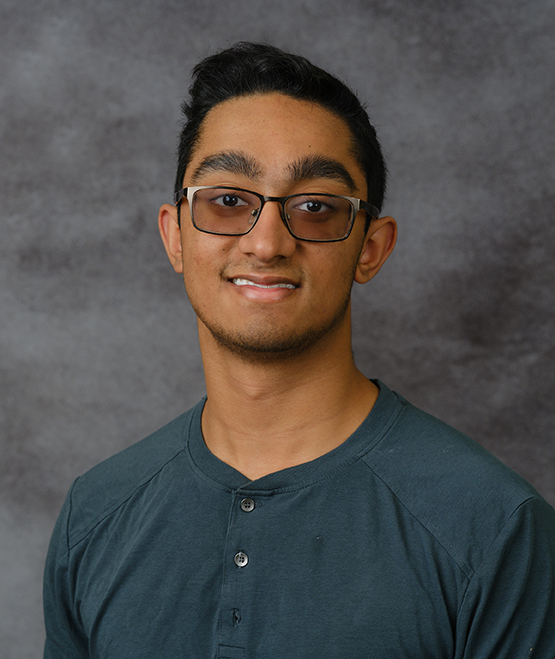

Hometown: Lewisville, NC
Major: Biochemistry and Molecular Biology; Spanish
Faculty Mentor: Michael Anderson, Biology; Arjun Potter, Biology
Major Scholarships: Stamps Leadership Scholarship Award; Porter B. Byrum Scholarship
Topic: Protecting African biodiversity by studying differences in drought resistance across species of trees
Check out any photo gallery of an African savannah and you’ll see Acacia trees. Sid Subramanian wasn’t content to peruse pretty pictures. He wanted to know why the trees mattered, and he went all the way to Tanzania to satisfy his curiosity and start a larger process.
In a research fellowship made possible by his Stamps Scholarship award, Subramanian investigated why some Acacia species tolerate drought better than others. The more researchers grasp these differences, the more they’ll be able to tailor and target their conservation efforts to help the planet.
Along the way, Subramanian taught Tanzanian students how certain pieces of ecological research equipment worked, and he learned a new language. Yes, Sid Subramanian speaks Swahili.
Savannah Longo (’24)
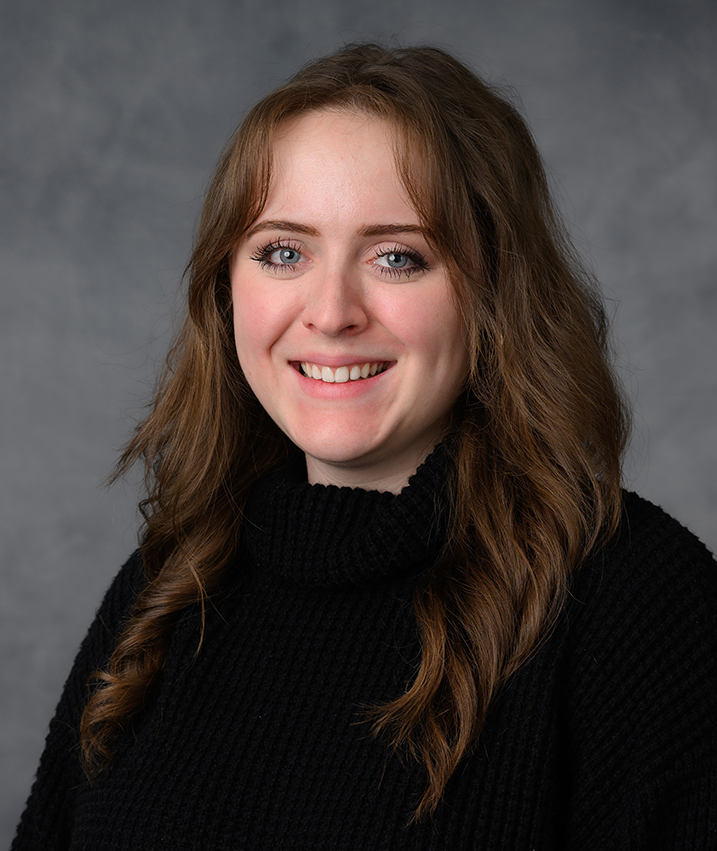

Hometown: Connelly Springs, NC
Major: Health and Exercise Science
Faculty Mentor: Osvaldo Delbono, Medical School
Major Scholarships: Julius Harshaw Corpening and Julius Shakespeare Corpening Scholarship; Saddye Stephenson and Benjamin Louis Sykes Scholarship; John William Slate, M.D. Scholarship; Lewis Reed Gaskin Scholarship
Topic: Potential relationship between loss of muscle mass and Alzheimer’s Disease
Savannah Longo didn’t need a year to figure out what she wanted to study at Wake Forest. Her grandfather had passed away before his time, at age 74, after suffering a broken leg as a firefighter and experiencing Alzheimer’s Disease thereafter.
“He was bedridden, his muscles declined and his cognitive decline accelerated,” she said.
This was going to be more difficult than pondering the whimsically benign conundrum of the chicken and the egg, but Longo went for it. Do cognition and neuromuscular symptoms go in tandem? Or does one precede the other?
Joining a Wake Forest School of Medicine lab as a freshman undergraduate, Longo quickly became a leader in the group. Over time, she and her colleagues have conducted research confirming findings that muscle loss is often a sign of eventual and exacerbated cognitive falloff.
As a result, the medical community is stepping up efforts to encourage a lifetime of exercise. And Longo, for her part, will attend physician assistant school and devote her career to that mission and other work like it.
Written by Rob Daniels | Photography by Lyndsie Schlink
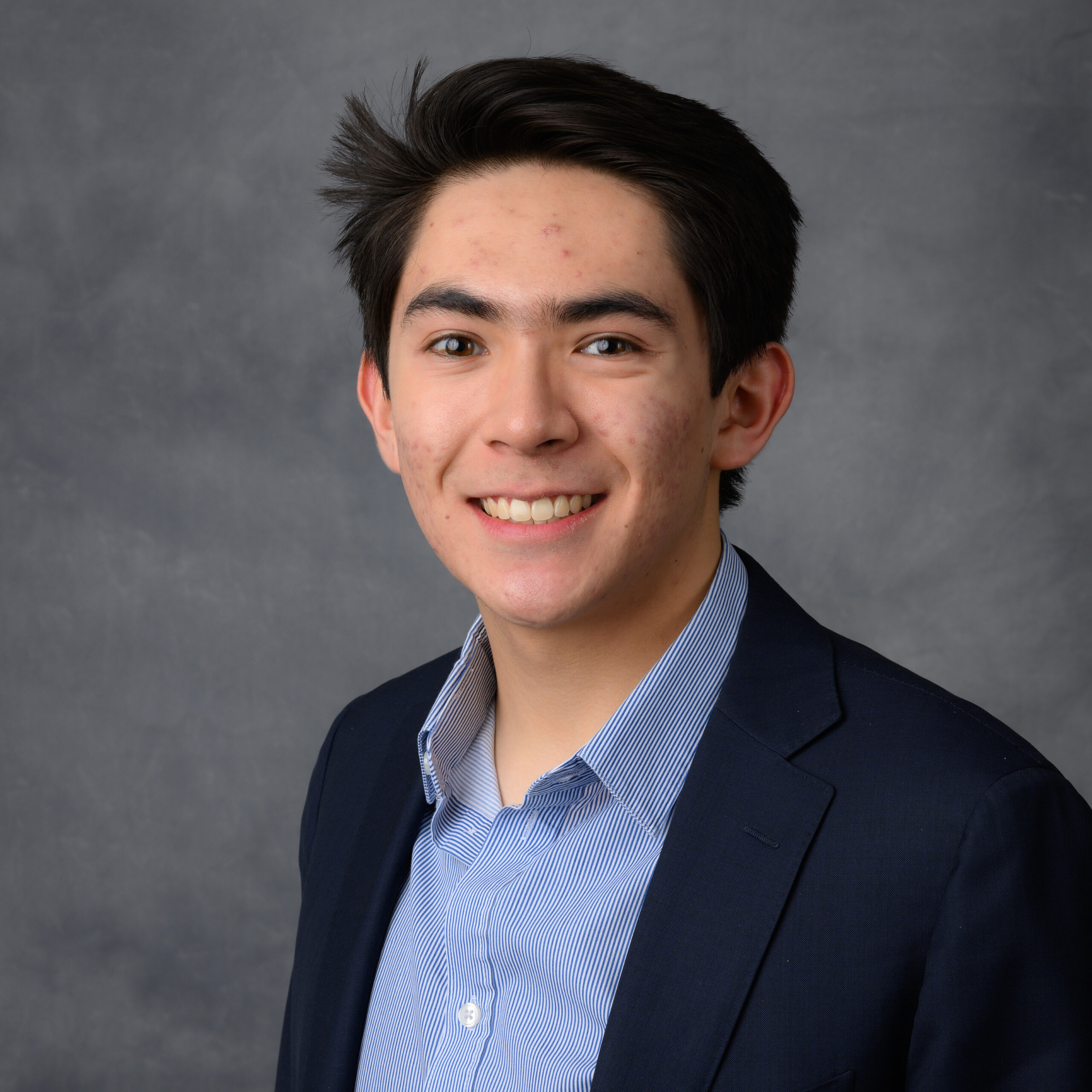
Boundless
Whether crossing borders or academic disciplines, Jae Canetti (’24) seeks solutions with a curious mind and grateful spirit

